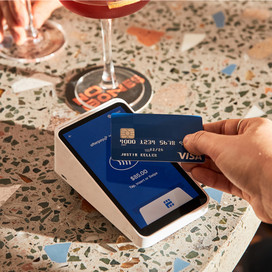Table of contents
If you’ve just launched a catering business or you’re in the process of starting one, making sure you get paid is probably front of mind. The nature of catering — taking advance bookings for groups, normally with large headcounts — makes invoices a preferred way of taking payments. They come with a number of benefits, like:
- Prompting and reminding clients to pay
- Letting clients know how and when payment is due
- Keeping concise, official records for the ATO
- Showcasing your brand identity
Invoice software
We have come a long way from the days of creating invoices in Word or writing them by hand. You can now create your catering invoices using invoicing software designed to cut out repetitive processes, simplify records, present your brand consistently and generally make it easier to get paid by enabling you to:
- Set automatic payment reminders
- Accept payments online
- Add attachments and receipts
- Securely save card information
- Schedule recurring invoices
- Track invoices and their payment status
Step-by-step online invoices for catering
If you’re new to online invoicing, there are a few things to get in order before you start. Think of invoicing as a form of customer service — doing it well retains clients and helps your business thrive; failing does the opposite. We’ve created this step-by-step guide to help you navigate the process of getting started with online invoicing.
1. Set your prices
Catering jobs can differ massively day to day, but customers want to know what they’ll be charged with no nasty surprises. This is where a pricing strategy comes in. Your pricing strategy is the method you use to price your catering services, based on the cost of:
- Ingredients
- Production and equipment
- Location overheads (i.e. how much it costs to keep your business running with gas, electricity and so on
- Staffing
- Transport and/or delivery
- Marketing
Once you’ve set your prices, it’s time to display them clearly on your business website for clients to see. Transparency is essential to good customer experiences, so be upfront about any service charges, show the breakdown of prices and include service descriptions.
2. Decide on deposits
Deposits aren’t compulsory for catering businesses, but they can be a wise choice. Not only do they provide cash flow in advance of jobs being delivered (thus ensuring there is always money in the bank), they help to avoid the disappointment and disruption of cancelled bookings.
Your invoice software should allow you to set up deposits so that you can request a portion of the full payment in advance. Square Invoices offers the ability to request and receive deposits. The amount you want to charge as a deposit amount is up to you, but many businesses charge up to 50%.
3. Build your invoice
Invoices can be built step-by-step from scratch, then saved, or you can use an invoice template. Whichever you decide on, here is some of the information you need to include:
- Invoice number
- The date of the invoice
- Your business’s name and contact information
- Your billing information (e.g. bank account or Transferwise details)
- A description of the services or goods provided
- The amount being charged
- A due date
- GST(if applicable)
Different requirements may apply depending on your type of business.
Invoices are a great way to show off your brand, but consistency is key to getting this right. Make sure the logo, colours and messages on every invoice are the same as those on your website, social media and so on.
4. Set up recurring invoices
To feel the full benefits of managing your invoices online, you can set up recurring invoices, which remove the hassle of sending them manually each time. Recurring invoices get automatically emailed by your invoicing software to a client at regular intervals for an agreed amount.
You’ll need to get a contractual agreement from your client to be able to invoice them recurrently. Your contract might include a termination date or confirm an open-ended setup where your recurring invoices get sent until a request for termination is made.
5. Set and communicate your payment terms
You increase the likelihood of getting paid on time for your catering services by being clear and upfront about your payment terms, such as how and when you want to be paid. You can do this in a number of ways:
- Before invoicing clients, strengthen the relationship with a mutually-binding contract or engagement letter
- Make sure your due date is clearly visible on each invoice
- Communicate late payment fees and refer clients to the Pay on Time or Pay Interest Policy
If you’re ready to start using online invoicing, Square Invoices let’s you build, send and track invoices for free. And all payments are charged at a flat 2.2% fee.
*This article is intended to offer helpful guidance and does not constitute qualified legal advice. Please consult an independent legal advisor, if you have any questions pertaining to your particular business.
![]()











